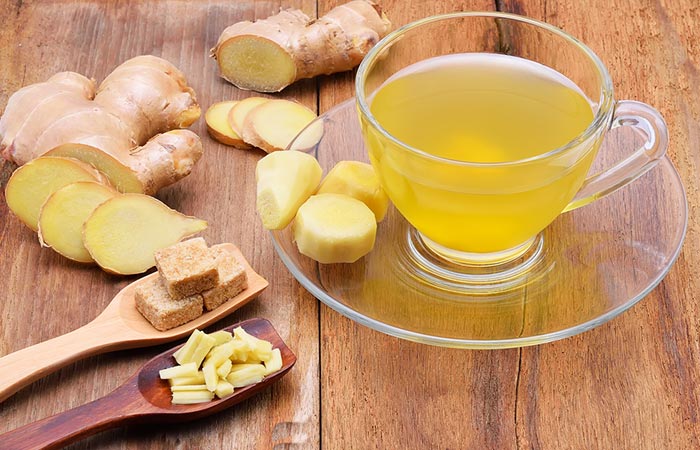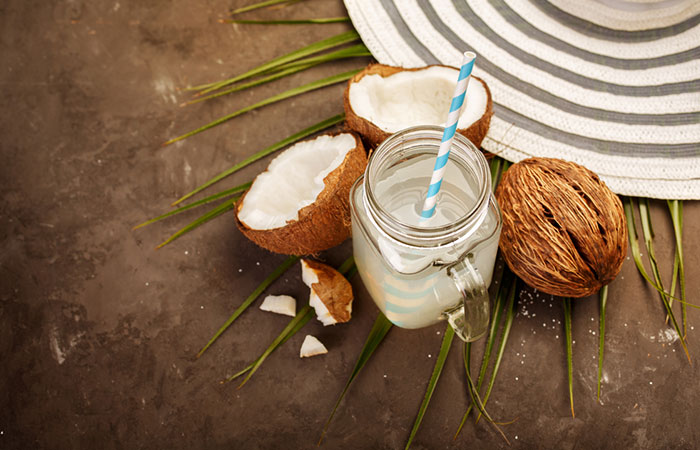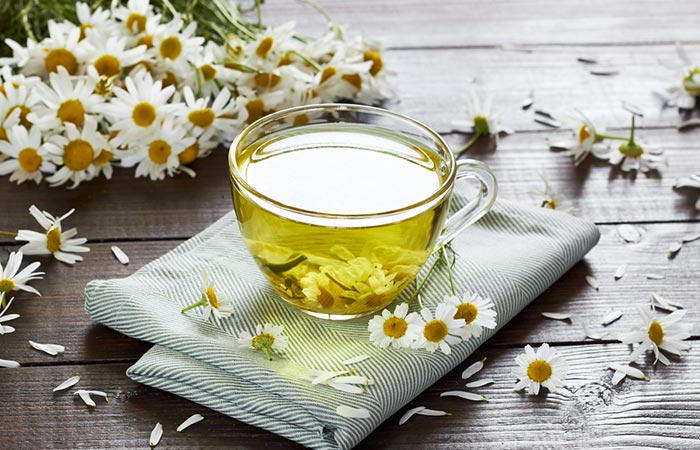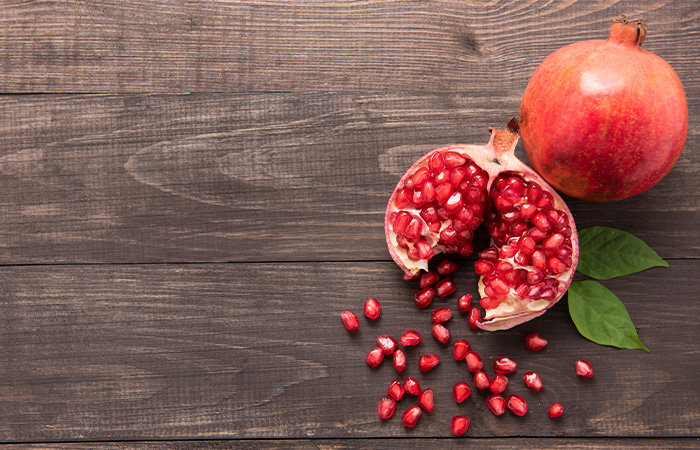Home Remedies For Gas And Bloating That Provide Relief
Image: Shutterstock
Ginger exhibits gastroprotective effects and has shown to treat various gastric problems like belching, bloating, dyspepsiai , indigestion, nausea, and vomiting
You Will Need
- An inch of sliced ginger
- 1 cup of water
What You Have To Do
- Add an inch of sliced ginger to a cup of water.
- Bring it to a boil in a saucepan and simmer for 5 minutes.
- Strain and allow the ginger tea to cool.
- Drink the tea.
- Alternatively, you can also chew on a small piece of fresh ginger.
How Often You Should Do This
You may do this 2 times daily.
8. Aloe Vera Juice
Aloe vera possesses gastroprotective properties that inhibit the secretion of gastric acid (13). Aloe vera juice, in combination with probiotic lactobacillus strains, can help in relieving gastrointestinal disorders (14).
You Will Need
2 tablespoons of fresh aloe juice
What You Have To Do
Consume two tablespoons of fresh aloe juice daily.
How Often You Should Do This
You may do this once daily for a week.
Caution: Do not opt for this remedy if you are pregnant as oral consumption of aloe can stimulate uterine contractions.
9. Yarrow
Yarrow exhibits antispasmodic properties ). These properties can help relax your intestinal muscles, thereby alleviating the symptoms of gastrointestinal issues like diarrhea and gastritis. Yarrow extracts can protect the gastric mucosa against bacteria and stomach acids ).
You Will Need
- 1 teaspoon of dried yarrow tea
- 1 cup of water
What You Have To Do
- Add a teaspoon of dried yarrow tea to a cup of water.
- Bring it to a boil in a saucepan and simmer.
- Strain the tea and allow it to cool down a little.
- Drink up.
How Often You Should Do This
You can do this 2-3 times daily.
10. Licorice
Licorice is associated with an increase in gastric mucosal defensive factors that can help in the treatment and prevention of gastric disorders like stomach ulcers . The glycyrrhizic acid in licorice shows anti-H. pylori (bacteria responsible for gastric ulcer) activity .
You Will Need
- 1 teaspoon of licorice root
- 1 cup of water
What You Have To Do
- Add a teaspoon of licorice to a cup of hot water.
- Steep for 5-7 minutes and strain.
- Drink the freshly prepared licorice tea.
How Often You Should Do This
You may do this 2 times daily.
Note: If you have hypertension or are pregnant or breastfeeding, avoid licorice. Also, do not overconsume licorice as it may lead to hypokalemia, high blood pressure, and arrhythmia.
11. Coconut Water
Image: Shutterstock
Coconut water exhibits gastroprotective activities by reducing the inflammation of the intestinal lining and enhancing the activity of the intestinal mucosal cells (19). Hence, it can help reduce bloating and gas.
You Will Need
1 glass of fresh coconut water
What You Have To Do
Consume a glass of fresh coconut water daily.
How Often You Should Do This
You may do this once daily.
12. Cinnamon
Cinnamon has anti-inflammatory, anti-spasmodic, and gastroprotective properties. Hence, it can help in treating digestive and stomach issues .
You Will Need
½ teaspoon of cinnamon powder
What You Have To Do
- Add half a teaspoon of cinnamon powder to your favorite dish and consume.
- You can also take cinnamon powder with a glass of water or juice with a teaspoon of honey.
13. Chamomile Tea
Image: Shutterstock
Chamomile not only reduces your stress levels but also improves digestion. It can help expel gas, relax gastric muscles, and improve digestion .
You Will Need
- 1 chamomile tea bag
- 1 cup hot water
What You Need To Do
- Steep the tea bag in a cup of hot water for 10 minutes.
- Sip on this hot herbal tea.
How Often You Need To Do This
Drink 2-3 cups in a day.
14. Pomegranate
Pomegranate has prebiotic properties that may help promote the good bacteria in the gut (22). This may promote digestion and help reduce gas and bloating.
You Will Need
- 1 ripe pomegranate
- ½ cup of water
- 1 teaspoon of organic honey (optional)
- A pinch of salt (optional)
- 1 teaspoon of lemon juice (optional)
What You Have To Do
1. Cut a pomegranate in half and place each half in a large bowl with the cut side facing down.
2. Tap the back with a spoon to release the seeds.
3. Add these seeds to a food processor with water and blend.
4. Sieve the juice using a mesh strainer or a cheesecloth.
5. Add honey, a pinch of salt, and lemon juice for enhanced flavor.
6. Pour the juice into a tumbler and enjoy.
Commonly used spices such as caraway, anise, cardamom, and turmeric have all been traditionally used to alleviate digestive issues. A teaspoon of baking soda in water can neutralize stomach acid. It is a quick DIY antacid, but it has to be taken with care (). While these home remedies can help you deal with gastric issues, you must also make a few changes to your lifestyle to prevent the recurrence of these issues. Listed below are a few tips that can help you.
Tips To Prevent Excessive Gas
- Eat slowly and chew your food properly while eating.
- The human body takes time to digest fried and fatty foods. It is strenuous for the digestive system and may lead to the trapping of gas in the gut .
- Spicy food can irritate the lining of the gastrointestinal tract, causing gas, bloating, and even diarrhea.
- Avoid chewing gum regularly.
- Avoid using straws while drinking fluids as they can cause you to swallow more gas.
- Avoid drinking carbonated drinks as they can lead to the formation of excessive gas in the intestines.
- Exercise regularly.
- Quit smoking.
- Limit your alcohol intake.
- Avoid consuming foods that are difficult to digest.
- Stay hydrated.
- Avoid lying down right after a meal.
- Take a warm bath or use a heating bag to relieve pain from excessive gas.
- Follow a BRAT diet until you recover completely from your gastric troubles. BRAT stands for bananas, rice, applesauce, and toast. All these foods are easy on your stomach as they can be easily digested.
Use these tips in combination with any of the remedies provided above to find relief from recurring gastric issues. However, if you develop any of the following symptoms, it is best to consult a doctor for further assistance.
When To See A Doctor
Most cases of gastrointestinal issues, like gas, are short-lived and do not require medical attention. However, if your condition persists and results in sleeplessness, loss of appetite, or interferes in any way with your day-to-day life, it is best to consult a doctor immediately.
Infographic: 7 Easy DIY Ways To Relieve Gas
open next page to continue reading….








